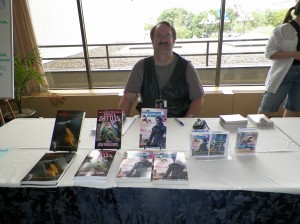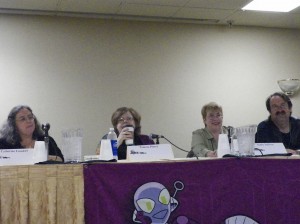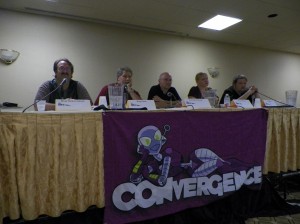 Okay, who am I kidding, the average writer’s budget is mostly provided by a day job. But let’s say, for whatever reason, you need to cut costs, like me. Who doesn’t have a limited budget, right? And most of these have the added benefit of being better for the environment too. Here are some tricks I’ve learned which can really help cut down on expenses and save on sanity and stress:
Okay, who am I kidding, the average writer’s budget is mostly provided by a day job. But let’s say, for whatever reason, you need to cut costs, like me. Who doesn’t have a limited budget, right? And most of these have the added benefit of being better for the environment too. Here are some tricks I’ve learned which can really help cut down on expenses and save on sanity and stress:
1) Make Your Own Coffeehouse. I hear lots of writers talk about going to the cafe or coffeehouse to write. Although I suppose part of this is the jolt they get from being around people going about their day, but I’m sure another part of it is very much the coffee. Yet Starbucks and those places aren’t cheap. You can buy quality coffee (or beans should you have a grinder) and make coffee cheaper at home. Then fill the thermos and take it out on your patio or porch to write. If you have a breakfast nook, you could go there. I’ve even taken the laptop and my caffeine to the park in an early morning and let the dogs run around while I enjoyed the coolness and created. My point is you don’t have to go to the coffeehouse daily to get the effect you need to write. Instead, you could limit it to a few times a week and find other ways to stimulate a similar environment with less expense. You might even find you prefer the self-made route more anyway.
2) Print Double-Sided. Double-sided printing is fairly standard for printers these days. I don’t print everything I write but before I make a second pass, I like to print it out and make editing notes then go back and polish. For one, it’s harder to take in the whole page on a screen (you mostly can’t unless it’s small), and, for another, I spent hours on the computer writing, editing, marketing, and hanging out. My eyes need a break. I find that time away refreshes me and allows me to read differently with a new energy. But paper and ink cartridges are expensive and you can go through them fast, so double-sided printing is one way to at least save on paper. I also use cheaper, thinner paper for drafts as well to save, although one must take care to maintain your printer and be sure you don’t use paper that might wear it down.
3) Recycle Ink Cartridges. Speaking of ink cartridges, recycling them has come a long way. Now Office Depot, Office Max, Kinkos, and other stores like Cartridge World specialize in this  and you can get new cartridges at half the cost by turning in the used ones in exchange for refilled ones. If you think it matters, save an original new cartridge to print anything you have to send out for business–manuscripts (rare these days), letters, contracts, etc.–and use the recycled ones for every day use. This is the majority of your printing and, believe me, over time you’ll save hundreds of dollars a year. Of course, printer companies make their fortune on cartridges, so beware they sometimes send software updates that disable the use of these cartridges. You have to be very careful which “upgrades” especially FIRMWARE that you install. But I have been doing this for two or three years and it’s really cut down my expenses.
and you can get new cartridges at half the cost by turning in the used ones in exchange for refilled ones. If you think it matters, save an original new cartridge to print anything you have to send out for business–manuscripts (rare these days), letters, contracts, etc.–and use the recycled ones for every day use. This is the majority of your printing and, believe me, over time you’ll save hundreds of dollars a year. Of course, printer companies make their fortune on cartridges, so beware they sometimes send software updates that disable the use of these cartridges. You have to be very careful which “upgrades” especially FIRMWARE that you install. But I have been doing this for two or three years and it’s really cut down my expenses.
4) Recycle Scratch Paper. Speaking of recycling, if you don’t print double-sided or you have stuff you printed one-sided that’s still in enough shape to run through the printer, consider using the back side and running it through again. Yes, I realize this can get confusing, especially if the stuff printed on the other side is a double-spaced manuscript page and you put a new manuscript on it. Easy fix: Make a pencil or pen ‘x’ on the old page before printing on it so you’ll know which. After all, this time it’ll be full an unusable so it won’t matter. You’ll use the non-x side until your done then put it in the recycling for the city. But you can get a lot of extra use these way for things you don’t need to send out. It’s like doubling the life of your paper, in a sense.
5) Library, Library, Library. Okay, we all love to read and do research. We’re writers, after all. But buying books gets expensive. Trust me, I’m an addict and really have to fight the urge. Libraries are often free and located in various places throughout the city. In fact, they often have free Wi-Fi too, so you can take your laptop along, do research, and refill your TBR pile all in one run. The environment doesn’t allow coffee, but it can help get that coffeehouse fix if you go at a busy time of day, too. As a bonus, by supporting the Library, you encourage the funders to recognize that people still value what it has to offer and you can build relationships with library staff which will benefit you later on.
6) Walk & Bike. Writer’s spend a lot of time sitting on our butts. And, if you dislike exercise, like me, you probably need an extra “kick in the butt” (so to speak) to force yourself to get physical. One great way to do it is to walk animals, but in lieu of that you can also walk or ride a bike to local places within a few miles of your house. Many cities have bike lanes or safe back routes to avoid heavy traffic and, thankfully, motorists in many places are more and more used to sharing the road with cyclists. There are also bike racks in a lot of places to lock up your bike. Ride to the library, ride to the park, ride to the grocery store if you just need a few things, or walk to any of these. You don’t have to ride or walk fast to get benefit. Yes, a certain pace increases the benefit, but just getting out and doing it can make a big difference that will ease the way toward steadier habits.
7) Antennas Work. It seems old-fashioned in the modern age, but I recently had to cut expenses and paying $35 for basic cable when I can get most of the same channels for free via an antenna seems ridiculous. Even more than that though, the digital signals are cleaner direct than run through the cable companies compressors and sent out over wires. That’s right. You can get the most amazingly clean tv signals you’ve ever seen with an old-fashioned antenna. And at a cost of $100-150 for a decent antenna and $50-100 for an amplifier if you live in a valley, like me, you save a lot of money in the long run. Be sure and remember that digital band is narrow. You need to take time to play with antenna placement to maximize. Literally millimeters can make the difference between getting 20 channels and 5. With digital, the signal is clear or absent. You don’t get those half-fuzzy channels like the old days, so it’s worth taking time to set it up right.
8 ) You Only Need One Phone. So why pay for two? Seriously. With unlimited plans and satellite signals, why not just cut back to a cell phone and forget the landline? Phone companies and cable companies offer discounts if you get phone with your DSL or cable internet, yes. But in the long run, how much do you really save once they take on all the fees? You pay monthly for unlimited long distance. Why pay for it twice? If you do your research and pick the right company, you can get a good deal even without a contract. Stuck on your phone number? Porting it over is usually free. I have the same home phone number I’ve had since 2000 when I moved to Saint Louis. I’ve ported it several times now and it’s great because wherever I go, even old friends who lost touch can find me. You can put your cell on the donotcall.gov list too, so don’t worry about those pesky sales calls. I’m still careful whom I give it to but it does save me a lot of money just have the one phone and it’s all I need.
 9) Hang Out At Home. Many writers are introverts. It’s common with creatives. But after spending so much time alone creating, we all need fellowship. It’s tempting to go out to restaurants, clubs, movie theatres, etc., but these days, all of those option have gotten expensive and the bills can add up fast. You can make your own fun, too by staying at home with friends to cook or barbecue, play board games, watch DVDs, listen to music and talk, dance, etc. In our fast-paced world, it’s often easy to forget the fun times we had as kids just playing games, chatting, etc. Unless you’re an RPG player, you might not bother at all anymore. Goodwill, Dollar Store, etc. all have board games cheap these days. Why not buy a few favorites and use them with friends to create your own hang out at much less expense? Unless you invite jerky friends, it’s a lot less hassle and often a lot more fun than a club. You can even buy cheaper booze elsewhere than across a bar, too.
9) Hang Out At Home. Many writers are introverts. It’s common with creatives. But after spending so much time alone creating, we all need fellowship. It’s tempting to go out to restaurants, clubs, movie theatres, etc., but these days, all of those option have gotten expensive and the bills can add up fast. You can make your own fun, too by staying at home with friends to cook or barbecue, play board games, watch DVDs, listen to music and talk, dance, etc. In our fast-paced world, it’s often easy to forget the fun times we had as kids just playing games, chatting, etc. Unless you’re an RPG player, you might not bother at all anymore. Goodwill, Dollar Store, etc. all have board games cheap these days. Why not buy a few favorites and use them with friends to create your own hang out at much less expense? Unless you invite jerky friends, it’s a lot less hassle and often a lot more fun than a club. You can even buy cheaper booze elsewhere than across a bar, too.
10) Buy Compact Fluorescent Lamps (CFLS) aka Energy Saving Bulbs. Folks, they cost more in the short term, but these bulbs last for years. I have them in every socket in my house and I am paying less for utilities now than I was when I lived in a one bedroom apartment with no CFLs. When we switched, our utility bills dropped immediately. A few months later, we upgraded from the one bedroom to a two bedroom and our utility bills stayed the same. And I have moved several times with the same bulbs and have yet to have one burn out. These things make a huge difference in energy use without requiring you to sacrifice light levels. And some energy companies will even give you some free for the most used lamps in your house. It’s worth checking into. Try one or two if you don’t believe me, but trust me, this is a worthwhile investment that will provide savings for the long run.
Okay, those are 10 great money saving tips for everyday use. Yes, some of them are for more than just writers, but then writers, I know, are usually living on small budgets, so they’re especially appropriate for us. Maybe you know some others. We’d love to hear about them in comments. I hope you can use these to save money for more important things and still enjoy a productive, writing life. I know I do. For what it’s worth…
 Bryan Thomas Schmidt is the author of the space opera novels The Worker Prince, a Barnes & Noble Book Clubs Year’s Best SF Releases of 2011 Honorable Mention, and The Returning, the collection The North Star Serial, Part 1, and several short stories featured in anthologies and magazines. He edited the anthology Space Battles: Full Throttle Space Tales #6 for Flying Pen Press, headlined by Mike Resnick. A freelance editor, he’s edited novels and nonfiction and also hosts Science Fiction and Fantasy Writer’s Chat every Wednesday at 9 pm EST on Twitter under the hashtag #sffwrtcht. A frequent contributor to Adventures In SF Publishing, Grasping For The Wind and SFSignal, he can be found online as @BryanThomasS on Twitter or via his website. Bryan is an affiliate member of the SFWA.
Bryan Thomas Schmidt is the author of the space opera novels The Worker Prince, a Barnes & Noble Book Clubs Year’s Best SF Releases of 2011 Honorable Mention, and The Returning, the collection The North Star Serial, Part 1, and several short stories featured in anthologies and magazines. He edited the anthology Space Battles: Full Throttle Space Tales #6 for Flying Pen Press, headlined by Mike Resnick. A freelance editor, he’s edited novels and nonfiction and also hosts Science Fiction and Fantasy Writer’s Chat every Wednesday at 9 pm EST on Twitter under the hashtag #sffwrtcht. A frequent contributor to Adventures In SF Publishing, Grasping For The Wind and SFSignal, he can be found online as @BryanThomasS on Twitter or via his website. Bryan is an affiliate member of the SFWA.





